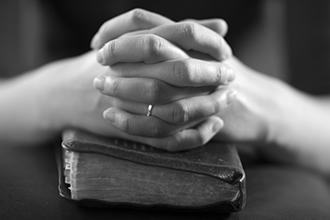 Prayer: one of the most powerful and puzzling aspects of Christianity. A prayer can range from a quick utterance to hours of dedicated intercession. Prayer is something that we can never do enough, yet there is no exact formula (even the Lord’s prayer is offered as a guide, not imposed as a rule). There are a rich variety of modes of prayer that can help believers enter into conscious, personal communion with God.
Prayer: one of the most powerful and puzzling aspects of Christianity. A prayer can range from a quick utterance to hours of dedicated intercession. Prayer is something that we can never do enough, yet there is no exact formula (even the Lord’s prayer is offered as a guide, not imposed as a rule). There are a rich variety of modes of prayer that can help believers enter into conscious, personal communion with God.
As Marshall Segal points out in an article on Desiring God, the Bible does not give us one overall picture or pattern to dictate how we should pray. Rather than trying to quantify our “prayer life,” we should start by simply asking ourselves “are we actually spending time communicating with God?” Here are several helpful practices to help us increase the amount – and enrich the quality – of the time we spend worshipping and connecting with the God of the Universe.
1. Pick a time and place, and be consistent.
You can pray anytime and anywhere […] The freedom to pray anywhere, though, often leads to praying nowhere. We should absolutely pray spontaneously whenever and wherever prayers arise in our hearts — during a break at work, before a test, in line with our groceries. But our lives are fueled by prayer, so we shouldn’t leave it up to spontaneity (we wouldn’t do that with fuel for our cars). Pick a consistent time and place when you can be alone.
2. Listen before you speak.
One important thing to learn early on about prayer is that it truly is a conversation. Just as God really does speak to us in his word, he is also really listening when we pray. It may just feel like journaling out loud at times, but there is always someone on the other side of prayer . . . Read something from the Bible (even just a verse) before you pray. Those words from God are “living and active, sharper than any two-edged sword, piercing to the division of soul and of spirit, of joints and of marrow, and discerning the thoughts and intentions of the heart” (Hebrews 4:12).
3. Prioritize the spiritual over the circumstantial.
Paul says, “We do not wrestle against flesh and blood, but against the rulers, against the authorities, against the cosmic powers over this present darkness, against the spiritual forces of evil in the heavenly places” (Ephesians 6:12). Does that mean we will never have to worry about or spend time on our physical needs — food, work, cancer? Absolutely not. “Give us this day our daily bread” (Matthew 6:11). It means life is mainly about unseen realities. At the end of each day, what matters most happens at the spiritual and emotional level, not the physical and circumstantial. That reality should be lived out in our prayer lives.
4. Don’t be afraid to stop and pray now.
Prayer should be prioritized and scheduled, but the beauty of our newfound freedom and mercy in Christ is that prayer can happen anywhere. It should start alone with God in your prayer closet, but it never needs to stay there. It must not stay there. Bring prayer into the cracks of your day. And I don’t just mean before meals. When you feel the impulse to pray, seize it. Take it as the prompting of the Spirit (Satan certainly won’t encourage you to pray).
5. Identify your prayer circles.
When I say “prayer circles,” I’m not talking about circles of people that pray in a group, but concentric circles of people in your life. […] I pray outward in circles, beginning with my own soul, then for my wife, then for our families, then for our small group and our church, then for our nation, and lastly for the nations, especially the unreached in the world. I don’t hit every ring every time, but the circles lead me as I pray each morning.
The rings should not keep us from praying for the random stranger we met yesterday. They’re just meant to keep the consistent people in our life consistently before us in prayer.
6. Truly ask from your heart.
If we’re honest, many of us lack courage and imagination in our prayer lives. We have a tiny little box of routine things we’re willing to ask God for, and we take on everything else — our questions, our frustrations, our dreams — on our own. We assume God’s not interested in or doesn’t have time for the small details of our day.
[…]
God cares about everything in your heart and life, down to the very smallest things. Paul says, “Do not be anxious about anything” — your random conversation with that friend, your sleep tonight, this month’s budget — “but in everything by prayer and supplication with thanksgiving let your requests be made known to God” (Philippians 4:6). Anything and everything, every day. Don’t be afraid to pray big prayers, and small ones.
7. Be willing to ask one more time.
Jesus knew we would lose heart in prayer, specifically that we would pray for things for long enough that we would start to question if God was listening or might ever answer. But he didn’t want us to lose heart or give up. He wanted us to keep asking, keep pleading, keep praying.
[…]
Don’t think now about praying for that need or desire for decades. Just focus on today. If God has given you a burden or a desire for another day, and you really believe that burden or desire might be from him, be willing to ask him one more time — one more prayer for relief, for reconciliation, for provision, for a breakthrough, for salvation. He’s still listening.



